Eros + Massacre Blu-ray Movie
HomeEros + Massacre Blu-ray Movie 
エロス+虐殺 / Blu-ray + DVDArrow | 1969 | 1 Movie, 2 Cuts | 216 min | Not rated | No Release Date
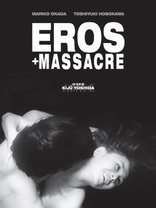
Price
Movie rating
6.7 | / 10 |
Blu-ray rating
| Users | 0.0 | |
| Reviewer | 4.5 | |
| Overall | 4.5 |
Overview
Eros + Massacre (1969)
In the 1920s, the anarchist revolutionary Sakae Osugi is financially supported by his wife, journalist Itsuko Masaoka. He spends his time doing nothing but philosophizing about political systems and free love and visiting with his lovers Yasuko and the earlier feminist Noe Ito. He conveniently defends three principles for a relationship between a man and a woman: they should be financially independent (despite the fact that he is not); they should live in different places; and they should be free to have sex with other people. In 1969, twenty-year-old student, Eiko Sokuta is sexually active with various men. Her friend, Wada, is obsessed with fire and they usually play odd games using a camera while they read about Osugi and Ito.
Starring: Mariko Okada, Toshiyuki Hosokawa, Yûko Kusunoki, Kazuko InanoDirector: Kiju Yoshida
| Foreign | Uncertain |
| Drama | Uncertain |
| Biography | Uncertain |
Specifications
Video
Video codec: MPEG-4 AVC
Video resolution: 1080p
Aspect ratio: 2.35:1
Original aspect ratio: 2.35:1
Audio
Japanese: LPCM Mono
Subtitles
English SDH
Discs
Blu-ray Disc
Four-disc set (2 BDs, 2 DVDs)
DVD copy
Playback
Region A (B, C untested)
Review
Rating summary
| Movie | 4.5 | |
| Video | 4.0 | |
| Audio | 4.0 | |
| Extras | 3.5 | |
| Overall | 4.5 |
Eros + Massacre Blu-ray Movie Review
Reviewed by Jeffrey Kauffman May 10, 2017Note: This film is available as part of the box set Kiju Yoshida: Love + Anarchism.
A lot of the forum activity on this site as well as others devoted to home theater aficionados tends to be filled with complaints about this or that
release, or even the state of physical media in general. I’d like to “accentuate the positive” for a moment, by acknowledging the fact that without
a
bevy of so-called “niche” labels like Criterion, Kino Lorber, Olive Films and, yes, Arrow (and its Arrow Academy imprint), those of us who love all
sorts
of different films would be much less significantly blessed with releases than we actually are, despite whatever technical issues arise from time to
time with any given release. Consider for a moment the name of Kiju Yoshida, an
arugably lesser remembered Japanese director whose name may not be recognized by many and which in fact was not even in our database here
at
Blu-ray.com until I added it for the purposes of this review and the reviews of the films in this set. It’s almost astounding in a way that any label
would devote its resources to releasing films by someone whose name doesn’t rise to traditional “marquee” levels, and for the efforts of labels like
Arrow who do offer sets like this one, I for one would just like to take a moment to offer some sincere appreciation. Yoshida, whose given name
was
Yoshishige, was born in 1933 and is still among the living (at the age of 84) as these reviews are being written. While Yoshida may not be as well
known in the United States as some of his Japanese contemporaries, in France he’s lionized as one of the most important directors of the post-
World
War II era, and that recognition may be especially understandable when placed within the context of what is kind of humorously referred to as the
Shōchiku Nouvelle Vague, or in more common vernacular, the Japanese New Wave (with a reference to the specific studio where Yoshida
and
some of his cohorts worked). The structural (or deconstructural, as the case
may be) proclivities of the French New Wave are shared by Yoshida, at least in the three films presented in this set, all of which defy traditional
narrative methods and which employ typical Nouvelle Vague approaches like quasi-montage and disjunctive editing techniques. The three
films in this set span a few years bridging the late sixties to the early seventies, and all three of them are considered part of a kind of loose trilogy
which offers a somewhat subversive political perspective with a similarly anarchic style.
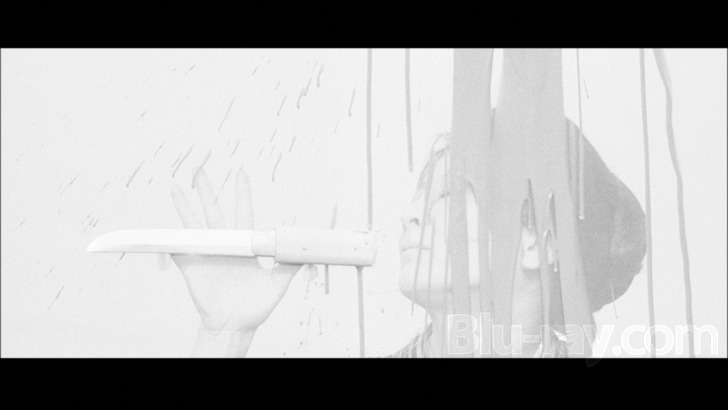
Note: Arrow has released this set with both the theatrical version and Director’s Cut of Eros + Massacre on separate discs (no doubt due to their length), so the specs above and delineation of the special features below reflect that aspect.
The very title of Eros + Massacre hints at some of the collisions Yoshida has in store in this film, for who would want to combine desire with calamity? But even this odd combination isn’t enough for Yoshida, for the film is an at times confounding aggregation of ideas and even timeframes, though as David Desser mentions in some scene specific commentaries and introductions for both versions of the film, budget constraints forced Yoshida to feature supposed Taishō period elements in "contemporary" (i.e., circa 1969, when the film was shot) settings, resulting in at least some of the disjunctive aspects. As with Coup d’état, also included in the Yoshida set, there is actual history underlying at least part of the tale Yoshida weaves, and it's rather fascinating history at that. Sakae Ōsugi (portrayed by Toshiyuki Hosokawa in the film) was a real life rabble rouser in late 19th and early 20th century Japan who, among other provocative actions, presaged a movement that would in fact become part and parcel of the ethos of the late sixties, free love. Yoshida is obviously attempting both in terms of basic presentational style and foundational plot elements as well as thematic aspects trying to tether these two eras together, and the result is often dreamlike.
The dialectic between history and current time provides much of the considerable energy Yoshida is able to develop in Eros + Massacre, this despite an approach that, if not traditionally expository, is nonetheless awfully talky at times. The film actually begins with a somewhat disquieting view of a young woman being questioned, and it almost seems as if something akin to Kafka’s The Trial is underway. It soon becomes apparent that it’s actually a bit less of an inexplicable bureaucratic event than a simply journalistic interview of Mako, the daughter of Ōsugi’s lover Noe Itō (both Mako and Noe are portrayed by Mariko Okada, obviously adding to the overlapping ambience of the film). The interviewer is Eiko (Toshiko Ii), one of two late sixties college students fascinated by the life and theories of Ōsugi (Desser makes the point that this particular plot element also allows Yoshida a potential “out” for staging historical elements in contemporary settings, suggesting that the history being depicted is actually the students’ imaginings of what happened).
Kind of incredibly, the “shorter” theatrical cut of Eros + Massacre runs around three hours, having been shorn of much content that real life Ōsugi paramour Ichiko Kamichika felt was an invasion of privacy, this despite the fact that her name was changed for the character based upon her in the film. That leaves the theatrical version feeling perhaps even more obfuscatory than even Yoshida may have intended, despite the film’s pretty hefty running time. The relationship between past and present is arguably handled more artfully in the longer director’s version (being seen for the first time for many viewers), though Yoshida is probably more concerned with general feeling and stylistic proclivities than with any clear narrative through line. Even with opaque elements, Eros + Massacre relatively clearly presents the idea that history is alive, coursing through contemporary life in unforeseen ways, informing reactions and behaviors even if participants aren’t actively investigating what’s gone before.
Eros + Massacre Blu-ray Movie, Video Quality 
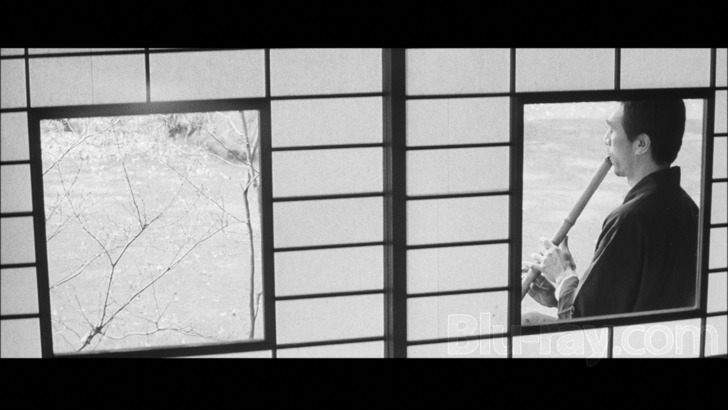
Note: Screenshots 1 - 20 are from the Director's Cut. Screenshots 21 - 30 are from the Theatrical Version.
Eros + Massacre is presented on Blu-ray courtesy of Arrow Academy in two versions on two Blu-ray discs with AVC encoded 1080p transfers in
2.35:1. Arrow provides only a kind of generic statement about these transfers in its insert booklet:
The transfers of Eros + Massacre, Heroic Purgatory and Coup d'état were supervised and approved by Kiju Yoshida, and supplied to Arrow Films on master tape via Carlotta Films, France.It's important to understand from the get go that Yoshida and his cinematographer Motokichi Hasegawa toy with the image, often pushing brightness and contrast to the point where whites intentionally bloom and detail all but disappears (Desser refers to several of these sequences as "overexposures"). That said, there are some interesting differences in this approach between the two versions (look for example at screenshot 4 from the Director's Cut and screenshot 23 from the Theatrical Version). While one has to defer to Yoshida's differing visions, to my eyes the Theatrical Version has an overall better delineated image, with more secure contrast and overall somewhat better looking detail levels. There are some density fluctuations and flickering in the Director's Cut that are either not as prevalent or in fact not even present in the Theatrical Version. Black levels are impressive in both versions, but the Theatrical Version has fewer of the blanched "historical" elements and therefore has a somewhat more homogeneous appearance. Also perhaps because of an overall darker ambience, the Theatrical Version has what is arguably better looking resolution of grain. My score for the Director's Cut is therefore probably a little closer to the 3.5 mark, though taken as a whole and discounting some of the relatively minor and transitory issues discussed above the two versions look very good to excellent throughout.
Eros + Massacre Blu-ray Movie, Audio Quality 

Both versions of Eros + Massacre feature LPCM Mono tracks (in the original Japanese), and while the two are largely interchangeable (in the shared sequences between the two films), to my ears there's perhaps just a hint more mid to high range in the Director's Cut, something that gives a slightly brighter quality to both dialogue and score, as well as making hiss in quieter moments perhaps a bit more evident. One way or the other, while both of these tracks have an undeniably boxy (and pretty "wet", as in lots of reverb) sound, neither shows the same sort of slight distortion that both Heroic Purgatory and Coup d'état have, however fleetingly. If Heroic Purgatory's sound design was obsessed with clacking footsteps in echoing chambers, Eros + Massacre is more concerned with some ambient environmental sounds, including wafting breezes, and those sound clear on both tracks, if again slightly boxy sounding at times.
Eros + Massacre Blu-ray Movie, Special Features and Extras 
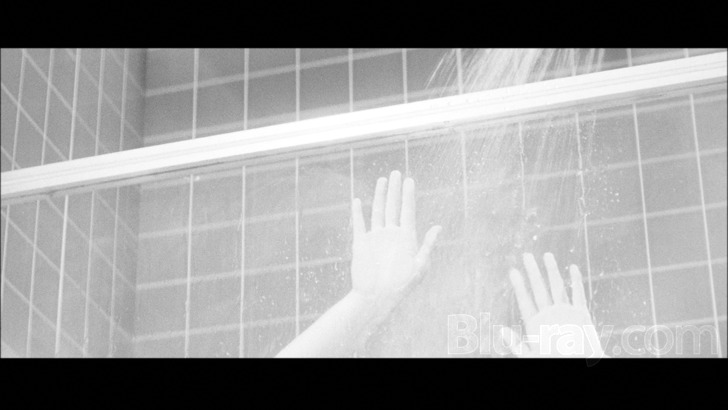
Theatrical Version (Disc One) (1080p; 2:45:15)
- Yoshida, or: The Explosion of the Story (1080p; 30:08) is a French piece with various French experts as well as Yoshida himself discussing the director in general and this film in particular. Kind of interestingly, Yoshida seems to see Eros + Massacre as something more of a procedural (with regard to the hero's death) than some people might glean from the finished film (in either version).
- Introduction by David Desser (1080p; 11:21) offers Desser's thoughts on what he considers to be Yoshida's masterpiece. Desser also briefly addresses Yoshida's need to cut the original version by nearly an hour.
- Commentaries by David Desser
- Taisho (1080p; 6:50)
- Politics (1080p; 5:25)
- Free Love (1080p; 4:58)
- Confrontations (1080p; 6:39)
- Earthquake (1080p; 11:26)
- Walking (1080p; 5:27)
- Directions (1080p; 7:38)
- Ending (1080p; 8:46)
- Theatrical Trailer (1080p; 3:30)
- Introduction by David Desser (1080p; 9:05) is different from the one on the Theatrical Version, and gets into more about the differences between the two versions of this film.
- Commentaries by David Desser
- Rugby (1080p; 2:01)
- A Doll's House (1080p; 3:11)
- Sister (1080p; 2:57)
- Godardian Absurdity (1080p; 9:31)
- Knife (1080p; 3:16)
- Caught (1080p; 9:26)
- Bluestocking (1080p; 4:09)
- Sleep (1080p; 2:43)
- Knifing (1080p; 14:15)
Eros + Massacre Blu-ray Movie, Overall Score and Recommendation 
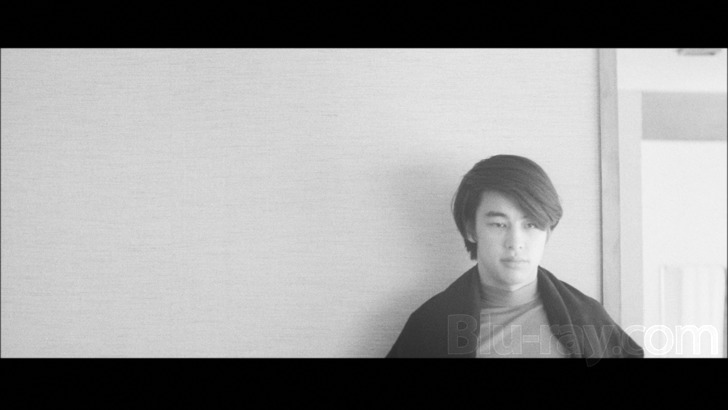
Having both versions of Eros + Massacre to watch and compare to each other is going to be a major allure for discerning film lovers, and while there are pluses and minuses to each version, the sheer astounding virtuosity of Yoshida is completely evident in both. I personally found the video quality of the Theatrical Version more consistent and therefore more pleasing than the Director's Cut, but both offer generally strong technical merits and very appealing supplements. Highly recommended.
Similar titles
Similar titles you might also like
(Still not reliable for this title)

Heroic Purgatory
煉獄エロイカ
1970

Coup d’état
戒厳令
1973

Poem
Uta / 哥
1972

The Image Book
Le livre d'image
2018

Mandala
Mandara / 曼陀羅
1971

Birds of Passage
Pájaros de verano
2018

Out 1
Out 1, noli me tangere
1971

This Transient Life
無常 / Mujō
1970

The Ballad of Narayama
Narayama bushikô
1983

The Insect Woman
にっぽん昆虫記 / Nippon konchûki
1963

Jules and Jim
Jules et Jim
1962

The Passion of Anna
En passion
1969

The Rite
Riten / The Ritual
1969

Yumeji
1991

One Sings, the Other Doesn't
L'une chante, l'autre pas
1977

Heart of Glass
Herz aus Glas
1976

Aquarius
2016

Ju Dou
1990

Goodbye to Language 3D
Adieu au langage
2014

Il Posto
1961